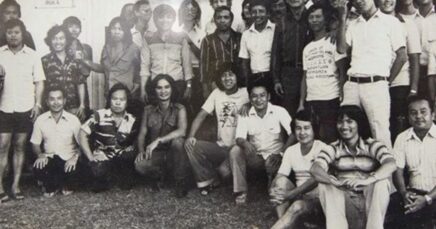Introduction
In 1977, hundreds of shop stewards, from every corner of Australia, wrote letters to a Mr Quirk of the Federal Department of Labour. In these letters they described the impact of union training courses on their understanding of industrial relations, their confidence in approaching management and their ability to represent members effectively.
Quirk was the Secretary of the Commission of Inquiry into the Future of Trade Union Training, established by the Fraser government to investigate the work of the Trade Union Training Authority (TUTA). TUTA had been established only two years earlier by a Commonwealth Act of Parliament, in the final months of the Whitlam government, and had been running courses for shop stewards, union officials and employees in every state and territory. It may be hard to believe today, but TUTA was fully government funded.
The archive of letters to the 1977 Commission, held in the National Archives of Australia’s Melbourne branch, provides an extraordinary snapshot of the significance of union training for workplace representatives, at a time when school completion rates were half of what they are today in Australia. For many participants in TUTA courses, this was their first experience of education since leaving school at fourteen or fifteen.
Letters
Here is a taste of the letters:
‘Since leaving school I had no further education until I attended a 4-day course run by the Trade Union Training Authority, in Perth. I gained so much from this course that it sufficiently motivated me to become a mature age enrollee at the West Australian Institute of Technology and to try to realize a long held ambition to do social work.’ (Truck driver and leading maintenance man, Metropolitan Water Board, member of Water Supply Union, Perth, WA).
‘I was very surprised at the quality of the training given to me. I have been a shop steward for nearly six years and had been a job delegate on a few jobs before that. The point I want to make is that before the course I had been neglecting the men I was representing by my ignorance. I was also not giving full benifit [sic] to my employers because I was not conversant in how to give a case to the employer without causing resentment because of my attitude. I was also completely in the dark over the Arbitration system and how it worked. I feel that there is no better plan for educating Shop stewards and ordinary workers than the system in operation now at T.U.T.A.’ (Shop steward, Werribee Victoria)
‘Speaking not only as a unionist but as a woman, because is far more difficult for a woman to become an active unionist, I must say that thanks to T.U.T.A. I was finally able to find out what Trade Unions are really all about and how they should be run. I have since had sufficient confidence to take an active interest in the affairs of my Union and speak out on issues that affect me.’ (Unionist, Hawthorn)
‘I want the enquiry to know the great benefit I have derived from T.U.T.A. courses. My understanding of industrial relations was nil. I did not realise what an Award or Conciliation and Arbitration meant, or the fundamentals of chairing a meeting, and the very thought of negotiating with Management made me feel quite inadequate, until I attended courses for instruction by T.U.T.A. With my new found knowledge came confidence and leadership. So much so, that today I hold an official position with the Federated Clerks’ Union, N.S.W. Branch.’ (Woman union official, Sydney)
‘The courses, being financed by the Government, allows for new and older Unionists and Shop Stewards to negotiate with Company Personnel and Industrial Managers, with greater ease, and to keep relationships between us at a higher level, which at most times lowers the rate of Disputes.’ (Shop Steward, AMWSU, Metal Manufactures, Maribyrnong)
‘The obvious worth of these courses is borne out by relatively large numbers of stewards from C.R.R.I.A. that have attended these courses and the low incidence of industrial disputes that have occurred in the Company during the same twelve month period. The industrial record of Mining Companies that have had a much lower ratio of stewards attending these courses has been much worse and therefore is reflective of the quality of training available.’ (Shop steward, Pilbara Mining Company, Cliffs Robe River Iron Associates)
‘The rank and file has been given very little opportunity in the past to find its own path. Now for the first time, they are able to learn, to move forward, to have confidence, not just to question the attitude of management, but to question the attitude of their own executives. Responsible unionism within; this criteria is now possible…’ (Clothing and Allied Trades Union)
‘Firstly as a new Australian I find the system of the work force in Australian [sic] different from any other country in the world […] This is such a complicated system that the workers in Australia don’t know the first things about the Arbitration Act. These schools are provided to teach the working class the history and Laws which govern this country. It should be taught at school to children who will one day make up the workforce, at least the basis of Unions, Arbitration, and the Employers point of view.’ (Unionist from Langford, W.A.)
‘I must admit to being a little sceptical of the Training Centre at first, but after deciding to do a couple of courses, my opinion was soon changed to one of surprise & appreciation, to think, at last we have a place where we can learn to present the workers complaints & communicate with management the problems that confronts one fellow workers. …I am happy to relate that the courses that I attended… have played a major part, in enabling me to prevent, three out of the last four strikes, where I am employed[,] from gaining momentum, & were brought to an agreeable conclusion by both parties.’ (Shop steward, Municipal Employees’ Union, Victoria)
The Inquiry Report led to an Amendment to the TUTA Act in 1978, bringing some changes to governance and a somewhat narrower definition of union training, but the Authority did survive and the Liberal Country Party government committed to continue the funding. TUTA would survive until 1996.
Explore Further
To find out more about TUTA’s work and legacies, check out this history project website.
Source
Source: Committee of Enquiry into Trade Union Training, NAA B146: 1977/2607 Part 1, item no 24194972 (National Archives of Australia).



